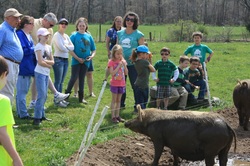 I spend a lot of time thinking about what our family eats. We raise our own meat, we have a veggie share from a local farm during the local growing season and I preserve whatever we don’t eat. We even grow a tomato garden and can our own tomatoes for winter. I read the back of almost every package we buy in the grocery store (though we try to avoid packages if at all possible). I put a lot of effort in to this and my children understand why. It’s conversation for us in the grocery store and at the dinner table. We value putting high quality ingredients into our body. So this is why I have such a hard time when other (well intentioned) people give my beautiful boys candy. It’s a treat for helping around the farm, a treat for getting together at a cub scout event, from friends for their birthday, from their teacher because they did well in school (!?), from their friends on Valentine’s Day and Halloween. “Treats,” people say. “It’s only one day,” people say. Here’s my perspective: These “treats” contain sugar, artificial colors and artificial flavors that I believe (from the research I’ve done) are VERY BAD for my kids’ bodies. So I actually don’t consider most candy “treats” and I don’t call them that in our house. But I don’t like to say no to my kids. It’s hard to take candy out of their mouths. Please don’t make me have to do this. Please value my kids as much as I do and don’t feed them junk food with poison in it. And I promise not to feed yours these low quality ingredients. I’ll show my love and appreciation for kids with hugs and kind words than toxic chemicals any day. I mean, look at these guys. I only want the best for them.
3 Comments
 Hopefully your CSA deliveries have started (or will start soon), or you’ve committed to heading to one of the local Farmer’s Markets this growing season (now that there’s one in Simsbury, Granby and East Granby). You’ll walk around and look over whose produce looks the best, decide which cut of meat you’d like to cook and make your decisions about what to buy based on looks, mostly. But what do you know about the farm you’re buying from? What are their farming practices? Being right there at the Farmer’s Market or CSA pickup gives you access to the farmer that you can never get in the grocery store. Take advantage of that! Get to know your farmer for your benefit and for theirs. Farmers love to talk “shop” and are usually happy to answer your questions. When I see someone at our farm store, I’m happy to take a couple of minutes to show them around so they can see how our animals live and what they eat. You may want to know, how do they grow their vegetables? What kind of herbicides or pesticides do they use, if any? How many of their fields do they rest in a year? How do they care for their animals? What do they get fed? Find out from the farmer, are there items that don’t sell as well as others? How can I cook something I’m not sure about? Click here for more questions to ask. Get a dialog going! And then spread the information you learned to help other people decide to shop for locally grown, nutritious, well-produced food that’s grown right here, by your neighbors. |
AuthorA blog about farming and food. Kate Bogli owns and operates Maple View Farm, raising livestock and growing veggies, with her husband Jason. The farm has been in his family for 65 years. Archives
October 2021
Categories
All
|
 RSS Feed
RSS Feed